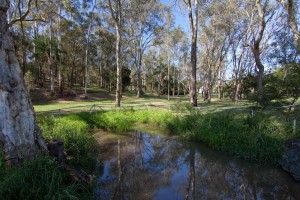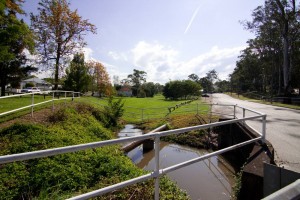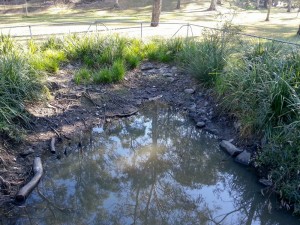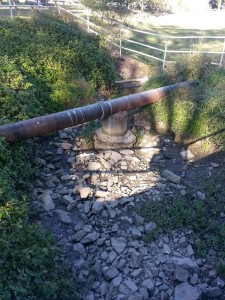A new page is coming soon, I promise! But while that is still in the wings, I thought this would be as good time as any to talk about the weather. Can anyone remember when it last rained? I can’t either, but according to the Bureau of Meteorology’s records, it was the 19th of July.1
That’s 45 consecutive rainless days, with more likely to come (the current forecast for each of the next seven days is “Fine, mostly sunny”). For the most part, the lawns and trees around the place aren’t looking too parched just yet — no doubt thanks to the relatively good rainfall we enjoyed during the first half of the year. But there are some clear signs that the landscape is drying up. A really good example is the pond straddling the bottom of Norman Buchan Park and the Government House grounds. Here’s what it looked like back in October of last year:
And here’s what it looked like as I passed by this morning on my way to the markets (note that I did not take these with a before-and-after comparison in mind, so the angles are different to the previous photos):
On the Norman Buchan Park side, there is but one small puddle remaining, while on the Fernberg side the water level has dropped significantly. How long before it dries out completely? I’ve been told by one keen observer that this pond did not completely dry up even during the millennium drought, which lasted from around 1997 until 2009.2 If that is the case then it seems likely that the pond receives water from a source other than the surface drainage from the surrounding hills. One possibility is that it is fed by an underground spring. This theory is lent weight by historical anecdotes such as J.C Heussler’s letter to the Lands Department in 1864 describing a permanent spring nearby, and John Oxley’s discovery in 1824 of a chain of ponds in the area in the midst of another severe drought (see here and here for more about Heussler’s and Oxley’s reports).
I hope the current dry spell does not last too much longer. But if it hasn’t rained before next Sunday, I’ll be sure to have another look on my way to the markets.
Notes:
- I’m not counting the 0.2mm that was recorded on 20 July or 1 September. These data are available from the Bureau’s web site. ↩
- See here and here for some more information about the drought. ↩





